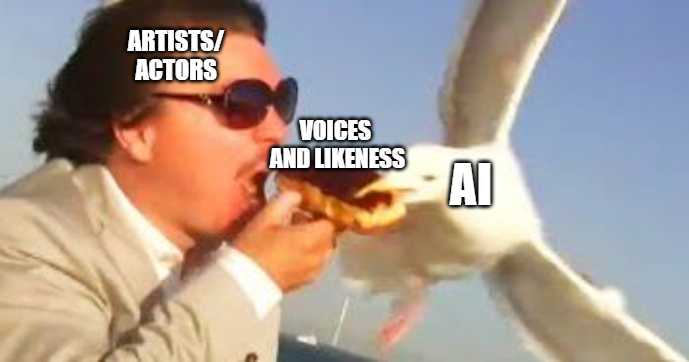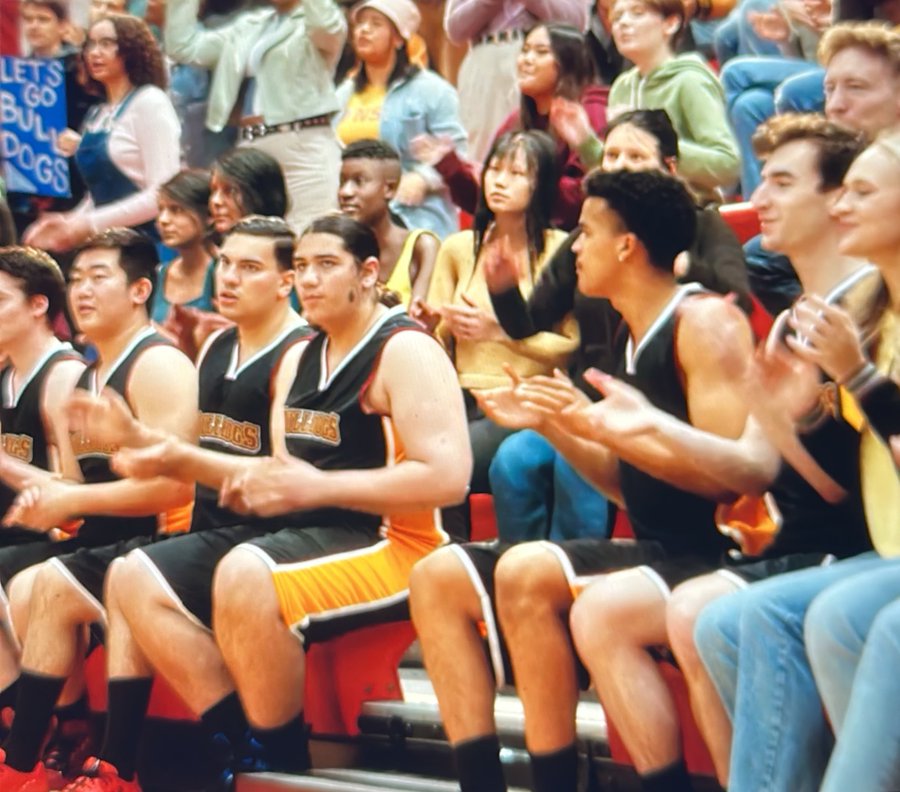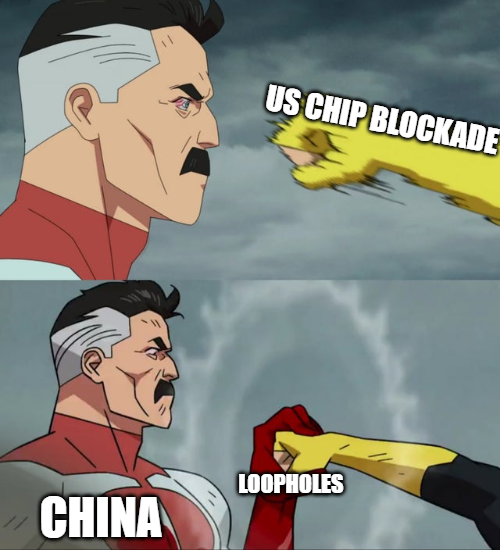AI causes trouble

Hi this is ZipLaw! We explain how news stories impact law firms so you can stand out in your applications.
Are you new here? Get free emails to your inbox.
Here’s what we’re serving today:
- AI music is causing trouble
- US tightens controls on China
- Herbert Smith Freehills and Sidley face off in Virgin rail claim
AI plus entertainment = trouble
In Short
Hollywood's tangled with AI, causing quite the ruckus, from misleading videos to digital songbirds.
What's going on?
Artificial Intelligence (AI) always makes the headlines lately. But this past week we saw some more focus on the entertainment side as big brands try to capitalise on this trends while actors get duped.

Here's a brief summary of what happened:
- Disney used AI to craft a promo poster for the show Loki and to spawn zombie-like extras in a film scene for Prom Pace (see below). Cool or creepy?
- Tom Hanks and Gayle King were "digitally duped." Fake AI versions tried to sell dental plans and weight loss products using their likenesses.
- The “No Fakes Act” bill popped up in response, aiming to penalize those using AI copies of people without consent. But US Congress? They're playing hard to get with approval.

Ghostwriter's AI Music Revolution
Ghostwriter (think mysterious music guru in a snowman costume) has been in the AI music game, using it to mimic the voices of celebs like Drake and The Weeknd.
Turns out he has a proposal for the industry:
- Embrace AI, Don’t Fight: He references the initial backlash against music sampling. Artists like De La Soul faced criticism, but now sampling is mainstream. So, why resist the inevitable AI wave?
- AI Voice Marketplace: Set up a place where artists can license their voices for AI use. Imagine picking out an Ariana Grande or Ed Sheeran voice filter for a track!
- Terms & Conditions Apply: Artists can set conditions. Want to use Beyoncé’s voice? Maybe she’ll say, “Sure, but no political songs, and I want 60% of the profits.”

While Ghostwriter's vision is innovative, it's not without hiccups. Music labels, being the gatekeepers they are, might be a tad picky about which voices get the AI treatment.
⚖️ How does this impact Law Firms?
Intellectual Property (IP) Rights:
- Rights Clearance: Before AI-generated content that mimics or borrows from existing copyrighted material is released, IP lawyers will be deeply engaged in licensing negotiations. They'll navigate the blurred lines of AI "creation" in relation to current IP laws and will perform intensive due diligence to determine the original content sources, ensuring there's no infringement.
- Infringement Litigation: IP lawyers will be central to legal battles over AI content infringements, whether representing the alleged infringer or the claimant. Given the novelty of AI in content creation, they'll be formulating arguments based on nascent case law and evolving regulations. Many of these cases might even end up in higher courts, shaping the very future of IP law concerning AI-generated content.
Media and Entertainment:
- Image Rights and Endorsement Deals: Lawyers in this field will be drafting contracts that safeguard artists' reputations from potential harm due to AI misrepresentations. Additionally, as AI's role in entertainment expands, there will be an increased need for revisiting and revising many existing contracts, encompassing new clauses that address AI's role in content generation, distribution, and monetisation.
- Defamation and Misrepresentation Claims: With high stakes in the entertainment industry, many disputes over AI-generated content might initially head to mediation. Lawyers will guide clients through these processes to avoid costly litigation, and they might also offer services to screen and review AI-generated content for potential defamation or misrepresentation before it's released.
Data Protection:
- Consent Mechanisms: Lawyers will draft specialised consent forms tailored to AI's unique data needs, ensuring users are aware of how their data might be used, especially when linked to AI's replication capabilities. Privacy policies will need to account for AI bias and discrimination risks. Regular checks will be necessary to ensure ongoing compliance with evolving data protection standards related to AI, and legal expertise will be required to guide and rectify any potential breaches.
- Data Breach and Misuse Claims: Lawyers will advise companies on best practices, security measures, and protocols to prevent potential data breaches or misuse related to AI processes. In the event of a data breach or misuse, these specialists will also represent companies or individuals in court, deciphering the intricacies of AI's involvement in the breach.
No Chips for You
In Short: The US is upping its "No Chips for You" game against China, trying to ensure they don't get their hands on fancy tech that might give them a leg-up in the military department.
Here's all you need to know.
1. The Great Chip Blockade
Remember when you'd sneak biscuits from the jar and your mum would suddenly upgrade her hiding spots? The US is doing the same with semiconductors and chipmaking gear.
Last year's rules had some loopholes, and China, like you with those cookies, found its way around them.
Now, the US wants to make sure China doesn't get graphics chips for AI and some advanced equipment.

2. The Evasion Dance
Some Chinese firms are trying to route shipments through other countries. It's like ordering something online but sending it to your friend's house so your parents don't find out.
The US is onto them and will be keeping a closer eye on such crafty moves. Plus, they're adding some Chinese firms to their "No-Trade-Zone" list.
3. Doubts and Drama
Last year, the US put restrictions on chip sales to China, but it was kind of like telling someone not to eat the last slice of pizza without guarding it.
Some allies kept selling advanced gear to China, and guess what? China made tech advancements, like a new smartphone with an advanced chip.
The US is now scratching its head, wondering how to stop China's tech growth, especially when the Huawei latest phone showed that China's semiconductor game is strong.
⚖️ How does this impact Law Firms?
International Trade:
- Export Controls Compliance: Given the US's tighter restrictions on exports to China, lawyers will be involved in drafting, reviewing, and advising on export control compliance programmes. They will help companies understand the nuances of the new rules and ensure that their international trade practices align with these updated regulations.
- Sanctions and Investigations: With the heightened scrutiny on trade between the US and China, there's an anticipated rise in investigations into potential breaches of these regulations. Lawyers will represent companies under investigation, advise on the potential legal and financial repercussions, and guide them through the complexities of international trade laws.
Intellectual Property (IP):
- Tech Patent Applications and Disputes: With the US trying to curtail China's technological advancement, Chinese firms may invest more in research and development, leading to an increase in patent applications. Lawyers will assist in drafting these applications, ensuring they're watertight and defendable. On the flip side, there might be more disputes over tech patents, where lawyers would represent firms in potential IP conflicts.
- Trade Secrets Protection: Companies will require legal guidance on how to protect their trade secrets, especially with the risk of technology transfer or theft in this tense trade environment. Lawyers will advise on best practices to safeguard these secrets and represent firms in any potential trade secret disputes or breaches.
Corporate and Mergers & Acquisitions:
- Due Diligence on Tech Investments: As Chinese companies accelerate investments in building domestic capabilities, lawyers will play a pivotal role in conducting due diligence for potential tech acquisitions or mergers, ensuring compliance with local and international regulations.
- Advisory on Strategic Partnerships: Given the restrictions and the evolving tech landscape, companies may look for strategic partnerships to navigate the challenges. Lawyers will advise on the legal implications of such partnerships, draft partnership agreements, and ensure that these collaborations don't inadvertently breach any international regulations.
Riding on Brand Value

Summary: Virgin bagged a whopping $115 million from U.S. rail operator Brightline after a London court decided that Brightline's move to drop the Virgin brand wasn't backed by solid reasons. The court believed that despite some negative press, Virgin's brand still chugs along with high repute.
Key Points to Take Away:
- Contractual obligations trump hearsay: Brightline's decision to terminate its contract with Virgin was based on its perception that Virgin's reputation had taken a hit. However, the court emphasized that perception isn't always reality. Judge Pelling highlighted that just because there's negative press doesn't mean a brand has lost its value. The court's message? Always back up decisions with concrete evidence, especially when contracts are in play.
- Brands are more than just headlines: Brightline believed that certain events, like Richard Branson's plea for a bailout for Virgin Atlantic and Virgin's discontinuation of the West Coast Mainline in the UK, diluted the brand's reputation. Yet, the court showcased the importance of actual market research over assumptions. Real-time data showed that Virgin remained a powerhouse brand, proving that brands are defined by more than just their recent headlines.
- The price of jumping the gun: Brightline's decision to prematurely terminate the contract cost them a whopping $115 million. This serves as a reminder that hasty decisions without concrete evidence can lead to expensive consequences. Plus, there's more to come; Virgin's second part of the case might further dent Brightline's pocket. So, before pulling the emergency brake, maybe check if there's an actual emergency?
Who’s advising on this?
Virgin Enterprises Ltd. is represented by Daniel Toledano KC, Emma Himsworth KC, and Maximilian Schlote of One Essex Court, instructed by Herbert Smith Freehills.
Brightline Holdings LLC is represented by Nigel Tozzi KC and James Hatt of 4 Pump Court, instructed by Sidley Austin.
👀 ZIPMEMES


Don't forget...
🙏 Our work is reader-supported. You can get a membership for cheap!
🎥 Follow us on Instagram here or TikTok here.
📫 Forward this to a friend and tell them to subscribe (hint: it's here).
